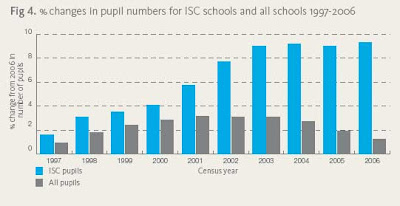The TES has been talking to some of the thousands of state school teachers who send their own children to independent schools.
For obvious reasons, many of them won't talk, but this is John, a primary deputy head in Norfolk:
“People say to me: ‘How can you teach in a state school if it is not good enough for your own child?’, but what I choose to do for a job shouldn’t come into it. Nobody has to bring their child to the school I work in; they go to the school they think is best, whether they have to pay for it or not. I know some people find it difficult, but I’m not going to give my daughter a poorer quality of life if I can help it.
I think I’m a good teacher, but I wondered whether I was good enough for my daughter. She goes to French club and knitting club, there’s a computer club and sports clubs, swimming and karate. She wouldn’t get that in a state school. She has developed and become more confident and can sit and read Harry Potter books. I can’t prove that wouldn’t have happened in the state sector, but I doubt it.”
Andrea Caish, an ex-head at a state primary in Gloucestershire, says:
“We weren’t happy with the large classes in state schools... we felt [our daughters] were drowning. One year the school had a mixed class, and as Victoria and Alex are only 18 months apart they were both in the same class, which we didn’t like too much. You are reduced to the level of the lowest in the class and if a child doesn’t behave then everybody suffers.”
Sam, a state school teacher in Kent, says:
"It went against my politics and it was something I wouldn’t have dreamt of considering a year or two earlier, but you have to be realistic. They’re your kids and you want the best for them, so you compromise your principles.”
We don't know how many state school teachers do this, but a couple of years ago the TES polled 700 of them, and a quarter admitted they would if they could afford to.
A vote of confidence in state provision it isn't.
Things are no better in the NHS. Last month we learned that 31,000 NHS health professionals have joined a cut-price Bupacare private scheme, including 12,000 doctors (5% of the UK total) and 15,000 nurses (2%). Overall, as we blogged here, 22% of NHS doctors already have private medical insurance, and one in three would prefer to be treated privately.
Peter Fisher, president of the NHS Consultants' Association, says:
"This demonstrates a lack of confidence in the NHS services they are providing if they won't take it themselves."
It certainly does Mr Fisher.
So is it hypocrisy? As very well informed consumers, these teachers and doctors are making the rational choice for themselves and their families. And we can hardly hold that against them.
But as with those private school parents Ruth Kelly and Diane Abbott, there is an important caveat. Although they can quite reasonably go on working in the public sector, they owe it to the rest of us to get out there and argue for the same choice to be extended to those who are not so well placed.
Because while plutocrats, MPs, NHS GPs, and state school teachers can afford to pay for private services on top of their taxes, most people simply cannot. The vast majority cannot afford to pay twice, and our dysfunctional top-down public services are all that's on offer.
The only known path to improvement is choice and competition, just like in the private sector. Public employees who go private must accept their special responsibility to bring that about.
PS How many MPs have their children privately educated? We don't know for sure but it's obviously a lot more than Diane Abbott, Ruth Kelly and George Osborne. For them, there is no hiding place. They have a clear duty to work energetically for the extention of comparable choice to ordinary parents.
